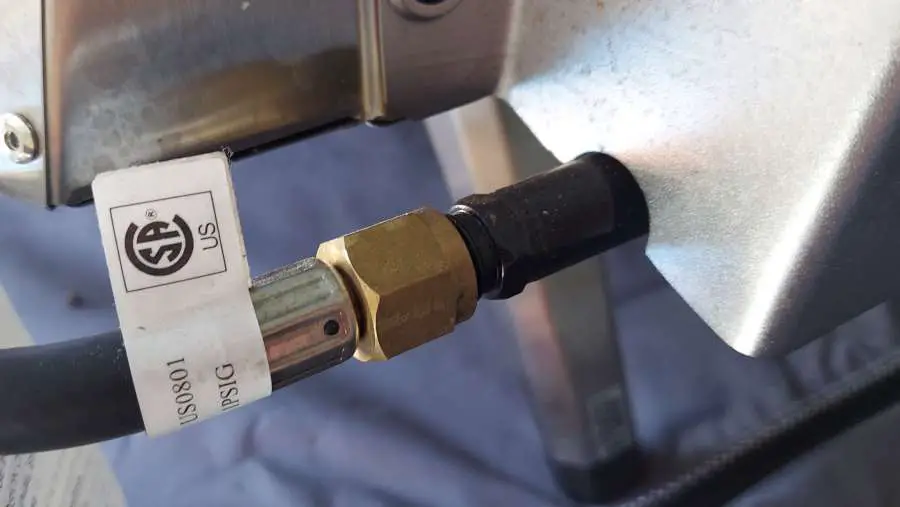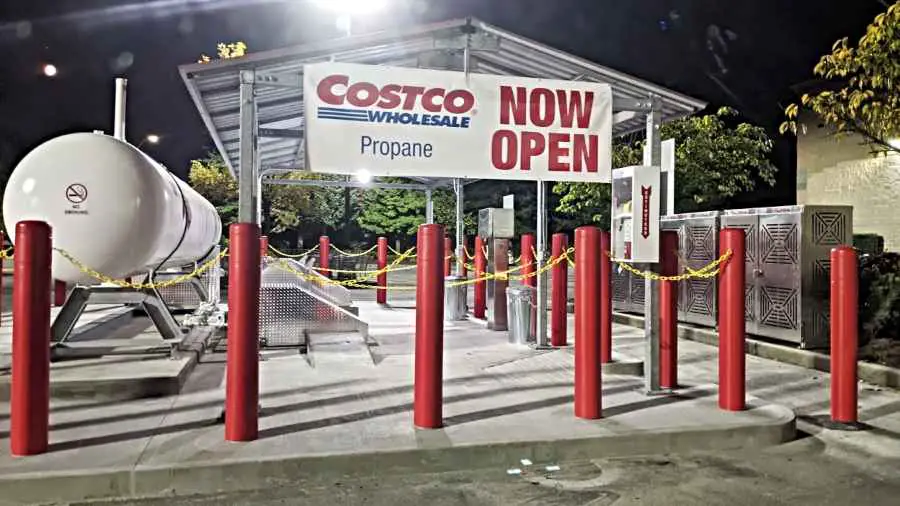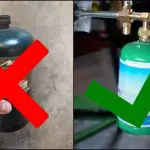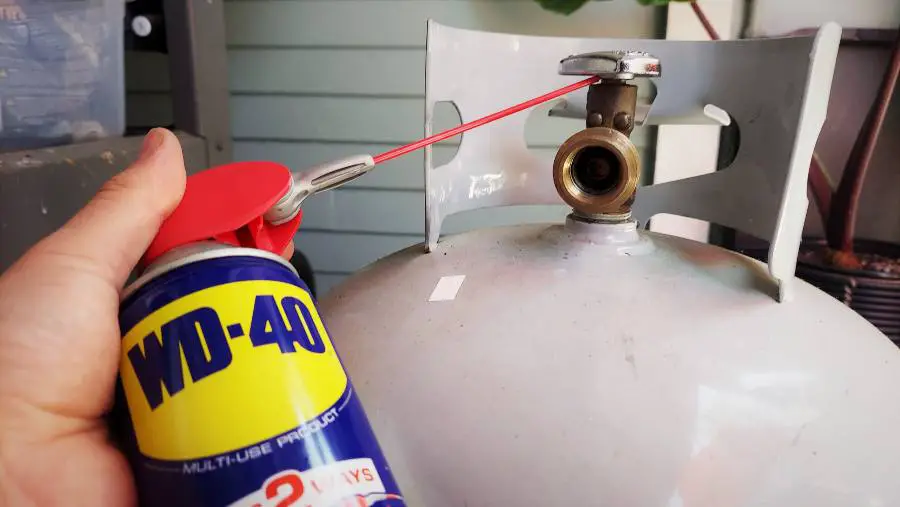Propane tanks are a common sight in many households, especially for those who enjoy outdoor grilling, camping, or require an off-grid power source. However, the question, “Can a propane tank explode?” often sparks concern among people. Understanding the risks and safety measures associated with propane tanks is crucial for anyone who uses them.
I recently wrote an article: “Is Helium Flammable”, and one thing I found interesting while writing it was how many people thought that since helium isn’t flammable, the tanks cannot explode or cause safety issues. This lead me to wanting to write this article to address the various scenarios that might lead to a propane tank explosion, and provide advice on how to prevent such incidents, since propane tanks are both flammable and under high pressure.
So to get back to the question, “Can propane tanks explode?”. To put it simply: Yes, propane tanks can explode, but such occurrences are extremely rare and typically preventable with proper safety measures. In 2001, a report by the United States Consumer Product Safety Commission stated that each year there are around 600 fire/explosions that occur with gas grills, however this was before the implementation of the new safety standard of the Overfill Protection Device which can be found on all new propane tanks.
In the following sections, I’ll delve into the specifics to help ensure your propane usage remains safe and efficient.
Propane: Is It Safe?
Propane is a versatile and widely used fuel source, it powers everything from home heating systems and generators to outdoor grills and camping stoves. Its portability and efficiency make it a popular choice for those looking to reduce their dependence on traditional power grids, or wanting to diversify their fuel sources.
Propane is stored under high pressure in tanks, and while these tanks are designed with multiple safety features, the potential for an explosion exists if they are improperly handled or maintained. For those relying on propane for daily living or critical projects, knowing how to manage and store propane safely is essential.
By understanding the conditions under which propane tanks might explode, you can significantly reduce the risks associated with their use. This knowledge not only enhances safety but also ensures the uninterrupted use of propane-powered devices and appliances. Whether you’re heating your home, fueling a generator, or simply enjoying a backyard barbecue, understanding propane tank safety helps protect your investments and your well-being.
The benefits of using propane extend beyond its practicality and efficiency. It’s a cleaner-burning fuel compared to gasoline and diesel, producing fewer pollutants and contributing to a healthier environment. Additionally, propane is often more cost-effective..
In summary, recognizing the importance of propane tank safety and understanding how to prevent potential explosions can have a significant impact on your off-grid lifestyle. It ensures the safe and reliable use of propane, allowing you to fully enjoy its benefits without the worry of hazardous incidents.
Propane Tank Parts and Types
Before I get into discussing propane tanks and their potential to explode, I like to start off my articles with some key terms to help you familiarize yourself with topics we’ll be discussing.
Key Terms and Definitions
Propane: Propane (C₃H₈) is a hydrocarbon and a type of liquefied petroleum gas (LPG). It’s commonly used as a fuel for heating, cooking, and powering various appliances. Propane is stored as a liquid under pressure and vaporizes into a gas when released from the tank.
LPG (Liquefied Petroleum Gas): This term refers to a group of hydrocarbon gases, including propane and butane, that are stored in liquid form under pressure. LPG is widely used for heating, cooking, and automotive fuel.
BTU (British Thermal Unit): A measure of heat energy. One BTU is the amount of heat required to raise the temperature of one pound of water by one degree Fahrenheit. Propane is valued for its high energy content, delivering approximately 91,500 BTUs per gallon. For reference, BBQ’s are typically around 30,000 to 60,000 BTU/hr.
PSI (Pounds per Square Inch): A unit of pressure. Propane is stored in tanks at pressures ranging from 100 to 200 PSI, depending on the temperature. Understanding PSI is crucial for handling propane tanks safely.
Regulator: A device attached to a propane tank that reduces the high pressure of the stored propane to a usable level for appliances. Regulators are essential for ensuring a consistent and safe flow of propane.
Valve: The mechanism on a propane tank that controls the release of gas. Properly operating the valve is crucial for safe propane usage.
Types of Propane Tanks
- Disposable Propane Tanks: These are small, single-use tanks often used for camping stoves and portable heaters. They are convenient but less economical and environmentally friendly compared to refillable options. While it is possible, you should never refill a disposable propane tank.
- Refillable Propane Tanks: Available in various sizes, these tanks can be refilled and reused multiple times. They are more cost-effective and sustainable, commonly used for home heating, grills, and generators. Check out my article on how to refill propane tanks for more info.
- Horizontal Tanks: Designed to lie flat, these tanks are typically used in RVs and other mobile applications where stability and space are considerations.
- Vertical Tanks: These stand upright and are the most common type used in residential and commercial settings. Vertical tanks should never be stored on their side.
Now that we’ve gone over some of the main terms we’ll be talking about, let’s get into it.
How Propane Tanks Work
Propane tanks are robust containers designed to store propane under high pressure. The liquid propane inside a tank remains in this state until the valve is opened, decreasing the internal pressure which then causes the liquid propane to boil, producing vapor. This dual-phase nature (liquid and gas) allows propane to be stored efficiently and used in various applications, while self-regulating pressure. Understanding how these tanks function is crucial for safe usage.
Pressure and Temperature Dynamics
The pressure inside a propane tank varies with temperature. For instance, at 70°F, the pressure inside a typical propane tank is around 125 PSI. As the temperature increases, so does the pressure. This is why it’s essential never to expose propane tanks to extreme heat, as it can cause the pressure to exceed safe limits and potentially lead to the pressure relief valve triggering and discharging propane from the tank. It is important to always keep your propane tank below 120°F, to reduce chances of internal pressure build up and propane escaping from the relief valve.
Safety Features
Modern propane tanks come equipped with several safety features. The pressure relief valve, for example, allows excess pressure to escape, preventing tank rupture. The Overfill Protection Device (OPD) ensures tanks are not overfilled, which can also lead to dangerous pressure levels. Regularly checking these safety features and ensuring they are in working condition is vital.
- Pressure Relief Valve: A critical safety feature that allows propane to vent if the pressure inside the tank exceeds safe levels. This prevents tank rupture or explosion.
- Overfill Protection Device (OPD): A safety feature required on all new propane tanks, preventing them from being overfilled. Overfilled tanks can lead to excessive pressure and potential hazards.
- Automatic Shut-Off Valve: Found in modern propane appliances, this valve stops the flow of gas if a leak is detected, enhancing safety.
- Tank Condition: Regular inspection of propane tanks for rust, dents, or damage is essential. Damaged tanks can lead to leaks and increase the risk of explosion.
Causes of Propane Tank Explosions
While propane tanks are designed with safety in mind, certain conditions can lead to explosions. Here are the primary causes:
- Exposure to Extreme Heat: Placing a propane tank in direct sunlight or near a heat source can cause the pressure inside to rise dramatically. If the pressure exceeds the tank’s capacity, it can lead to an explosion. Always store propane tanks in a cool, shaded area to prevent this risk. Due note however, this is only in extreme cases and leaving your propane tank outside in the sun will result in the pressure relief valve triggering first.
- Physical Damage: Dropping a propane tank or striking it with a heavy object (like a hammer) can damage the tank and compromise its integrity. Dents, cracks, or other forms of damage can lead to leaks and increased explosion risk.
- Leaking Propane: A leaking tank poses a significant explosion hazard. Propane is highly flammable, and even a small spark can ignite it. If you smell propane (which has a distinct, strong odor added for safety, typically referred to as rotten eggs), move away from the tank and call emergency services. For more information leaks, read my article on how to check for propane leaks and fix.
- Improper Storage: Storing a propane tank in an enclosed space, like a hot car or a small shed, can lead to dangerous pressure build-up. Always store tanks in well-ventilated areas away from direct heat sources.
An example of a propane tank explosion due to a propane leak caused from increased internal pressure happened in 2000 at an Amerigas plant in Ohio, which resulted in around 100 tanks being recalled. Thankfully, there were no deaths and only one worker received minor burns.
On July 19, 2000, some AmeriGas overfilled cylinders vented propane and ignited, causing an explosion at the AmeriGas plant in Willoughby, Ohio. As a result, AmeriGas Propane L.P. recalled about 100 overfilled propane cylinders distributed in the Detroit, Mich. area in July 2000. One worker suffered minor burns. No consumer injuries have been reported. – United States Consumer Product Safety Commission
Below is a video of a car explosion that occurred when a woman transporting a propane tank that was still connected to a bbq caused an explosion by smoking a cigarette in her car.
Tips for Safe Propane Tank Use
- Regular Inspections: Periodically inspect your propane tanks for any signs of wear or damage. Check the valve, regulator, and pressure relief valve to ensure they are functioning correctly. Replace any damaged parts immediately.
- Proper Storage: Store propane tanks upright in a well-ventilated area. Never store them in basements, garages, or other enclosed spaces. Keeping tanks away from direct sunlight and other heat sources is essential to maintain safe pressure levels.
- Handling Leaks: If you suspect a leak, do not attempt to fix it yourself. Turn off the valve if it is safe to do so and move away from the area. Contact your propane supplier or emergency services for assistance.
- Using Propane Tanks: When using propane tanks with grills, heaters, or other appliances, ensure the connections are secure and there are no leaks. Use soapy water to check for leaks around the valve and connections – bubbles will form if there is a leak.
- Transportation Safety: When transporting propane tanks, secure them upright in your vehicle. Avoid leaving tanks in a hot car for extended periods. It’s best to transport tanks on cooler days and remove them from the vehicle as soon as possible.
FAQ’s
Can a propane tank explode?
Yes, a propane tank can explode, but such occurrences are extremely rare. Explosions typically result from exposure to extreme heat, severe physical damage, or significant leaks. Proper handling and storage can prevent these incidents.
Can a propane tank explode in the sun?
While direct sunlight can increase the pressure inside a propane tank, it is unlikely to cause an explosion. However, it’s best to store tanks in shaded, well-ventilated areas to avoid unnecessary pressure build-up.
What causes propane tanks to explode?
Propane tanks can explode due to exposure to extreme heat, physical damage, or significant leaks. Proper maintenance, handling, and storage are crucial to preventing such incidents.
Can an empty propane tank explode?
An empty propane tank still contains residual propane vapor, which can be ignited under certain conditions. Treat empty tanks with the same caution as full ones, ensuring they are stored safely.
Can a propane tank explode if dropped?
Dropping a propane tank can cause physical damage, potentially leading to leaks and increased explosion risk. Handle tanks carefully to avoid dents, cracks, or other damage.
Can a propane tank explode in a hot car?
Leaving a propane tank in a hot car can cause the pressure inside to rise, increasing the risk of an explosion. Always transport and store tanks in cooler, well-ventilated areas.
Can a propane tank explode in a fire?
Yes, a propane tank can explode in a fire. The heat can cause the pressure inside the tank to rise rapidly, leading to a rupture. Keep propane tanks away from open flames and high-heat sources.
Can a propane tank explode if hit with a hammer?
Striking a propane tank with a hammer can damage the tank and create leaks, increasing the risk of an explosion. Avoid hitting or dropping tanks to maintain their integrity.
How hot before a propane tank explodes?
Propane tanks are designed to withstand high temperatures, but pressures become hazardous at around 120-150°F. It’s critical to avoid exposing tanks to such temperatures.
How far from the house should a propane tank be placed?
For safety, propane tanks should be placed at least 10 feet from any building. Larger tanks may require even greater distances as specified by local regulations.
Is it safe to leave a propane tank attached to a grill?
Leaving a propane tank attached to a grill can be safe if the grill and tank are stored outdoors in a well-ventilated area. Always turn off the tank valve when not in use.
What should I do if my propane tank is leaking?
If you suspect a leak, turn off the valve if it’s safe to do so and move away from the tank. Avoid any sparks or open flames and contact your propane supplier or emergency services immediately.
Conclusion
Understanding the potential risks associated with propane tanks and how to mitigate them is crucial for anyone using propane for heating, cooking, or powering appliances. Throughout this article, I’ve addressed the primary causes of propane tank explosions, emphasizing that while they are possible, they are extremely rare and preventable with proper safety measures.
Key points covered include:
- How Propane Tanks Work: Knowing the dynamics of pressure and temperature inside a propane tank helps in understanding why safe storage and handling are essential.
- Causes of Explosions: Exposure to extreme heat, physical damage, and significant leaks are the main causes of propane tank explosions.
- Safety Tips: Regular inspections, proper storage, careful handling, and immediate action in case of leaks are critical for safe propane use.
Choosing the right propane tank and using it correctly can significantly enhance safety and efficiency in your off-grid living or DIY projects. By following the guidelines provided, you can minimize the risks and enjoy the benefits of this versatile fuel.
Final tips for safe propane usage include:
- Always store propane tanks in a cool, well-ventilated area, away from direct sunlight and heat sources.
- Handle tanks carefully to avoid physical damage, and regularly check for signs of wear or leaks.
- Ensure all connections and valves are secure and functioning properly before use.
- Never leave propane tanks in enclosed spaces like hot cars or garages.
By taking these precautions, you can confidently use propane to power your off-grid life, ensuring safety and reliability. Understanding and respecting the properties of propane will help you avoid potential hazards and make the most of this efficient and eco-friendly fuel source.
Additional Resources and Data Sources
Here are some links to additional resources as well as some references from within the article.
- CPSC, AmeriGas Propane L.P. Announce Another Recall of Propane Cylinders
- New, Safer Propane Tank for Barbecue Grills Helps to Avoid Gas Leaks- Device Expected to Prevent Many of the 600 Fires/Explosions Each Year
- Propane tank explodes in SUV when passenger lights cigarette, police say
I hope this article on the possibilities of propane tanks exploding has been useful, and please feel free to reach out with any questions, concerns, or comments.
Thank you and God bless!




